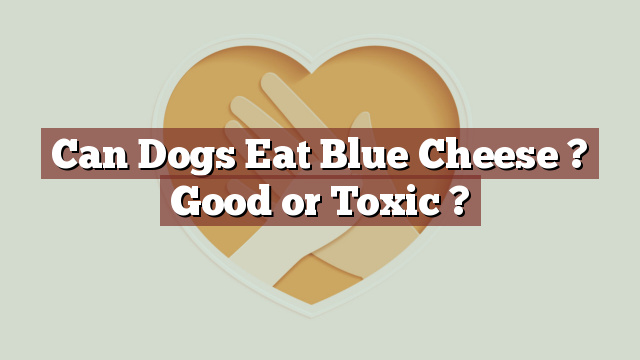Can Dogs Eat Blue Cheese? Good or Toxic?
Knowing which foods are safe for your dog to eat is crucial for their overall health and well-being. While it’s tempting to share your favorite snacks with your furry friend, it’s essential to understand whether certain foods are safe for them or not. One such food that often raises questions is blue cheese. In this article, we will explore whether dogs can eat blue cheese and discuss the potential risks and benefits associated with feeding it to them.
Nutritional Value of Blue Cheese: Minerals, Vitamins, and More
Blue cheese is known for its strong flavor and distinctive blue veining. It is made from cow’s, sheep’s, or goat’s milk and undergoes a specific aging and ripening process that gives it its unique taste. As for its nutritional value, blue cheese contains essential minerals such as calcium, phosphorus, and zinc, as well as vitamins A and B12. However, it is important to note that blue cheese is also high in fat and salt content, which can be problematic for dogs.
Can Dogs Eat Blue Cheese? Understanding Safety for Your Pet
Can dogs eat blue cheese? The answer is no. Blue cheese is not considered safe for dogs to consume. This is mainly due to its high fat and salt content, which can potentially lead to adverse health effects. The consumption of excessive fat can contribute to obesity, pancreatitis, and digestive issues in dogs. Furthermore, the high salt content in blue cheese can lead to sodium ion poisoning, causing symptoms such as vomiting, diarrhea, increased thirst, and even kidney damage.
Scientific and veterinary insights support the notion that blue cheese should not be a part of a dog’s diet. Veterinarians recommend avoiding foods high in fat and salt, as they can be detrimental to a dog’s health in the long run.
Potential Risks and Benefits of Feeding Blue Cheese to Dogs
Feeding blue cheese to dogs can pose several risks. The high-fat content can lead to weight gain, obesity, and associated health problems such as heart disease and joint issues. Additionally, the excessive salt in blue cheese can be harmful to a dog’s kidneys and overall sodium balance. It is important to remember that dogs have different nutritional needs than humans, and foods that are safe and enjoyable for us may not be suitable for them.
While blue cheese may not provide any significant health benefits for dogs, it is worth mentioning that some dogs may be able to tolerate small amounts without experiencing any adverse effects. However, it is crucial to consult with your veterinarian before introducing any new food into your dog’s diet.
What to Do If Your Dog Eats Blue Cheese: Steps to Take
If your dog accidentally consumes blue cheese, it is essential to monitor them closely for any signs of discomfort or adverse reactions. If your dog only ingested a small amount, they may not experience any noticeable symptoms. However, if your dog exhibits vomiting, diarrhea, lethargy, increased thirst, or any other concerning signs, it is recommended to contact your veterinarian.
In case your dog consumed a large amount of blue cheese or shows severe symptoms, it is advised to seek immediate veterinary assistance. The veterinarian can provide appropriate guidance based on your dog’s specific situation and take necessary measures to ensure their well-being.
Conclusion: Moderation and Consultation are Key for Blue Cheese
While blue cheese may be a delectable treat for us humans, it is not a safe food to share with your canine companion. The high fat and salt content in blue cheese can potentially lead to various health complications in dogs. It is crucial to prioritize your dog’s well-being and provide them with a balanced and appropriate diet.
If you are unsure about whether a particular food is safe for your dog, it is always best to consult with your veterinarian. They can offer valuable insights and guide you in making informed decisions regarding your dog’s nutrition. Remember, moderation and consultation are key when it comes to feeding your furry friend, ensuring their health and happiness for years to come.
Thank you for investing your time in exploring [page_title] on Can-Eat.org. Our goal is to provide readers like you with thorough and reliable information about various dietary topics. Each article, including [page_title], stems from diligent research and a passion for understanding the nuances of our food choices. We believe that knowledge is a vital step towards making informed and healthy decisions. However, while "[page_title]" sheds light on its specific topic, it's crucial to remember that everyone's body reacts differently to foods and dietary changes. What might be beneficial for one person could have different effects on another. Before you consider integrating suggestions or insights from "[page_title]" into your diet, it's always wise to consult with a nutritionist or healthcare professional. Their specialized knowledge ensures that you're making choices best suited to your individual health needs. As you navigate [page_title], be mindful of potential allergies, intolerances, or unique dietary requirements you may have. No singular article can capture the vast diversity of human health, and individualized guidance is invaluable. The content provided in [page_title] serves as a general guide. It is not, by any means, a substitute for personalized medical or nutritional advice. Your health should always be the top priority, and professional guidance is the best path forward. In your journey towards a balanced and nutritious lifestyle, we hope that [page_title] serves as a helpful stepping stone. Remember, informed decisions lead to healthier outcomes. Thank you for trusting Can-Eat.org. Continue exploring, learning, and prioritizing your health. Cheers to a well-informed and healthier future!

